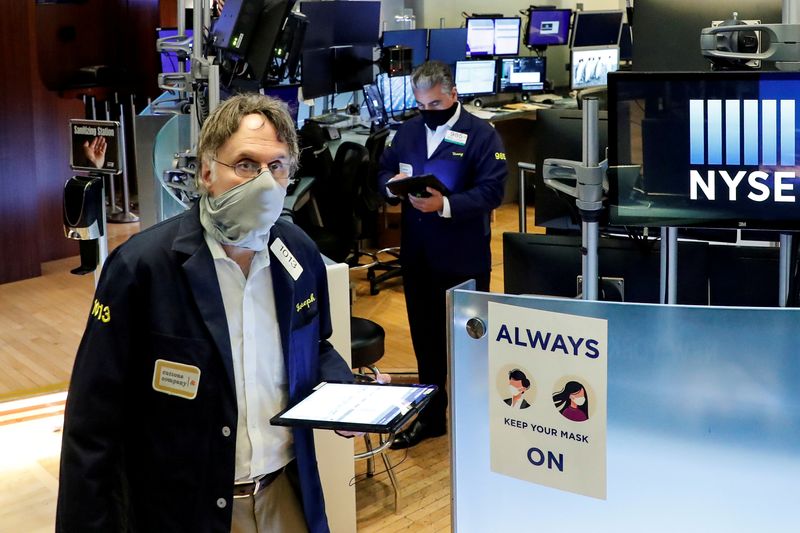By Saqib Iqbal Ahmed
NEW YORK (Reuters) -Investors are preparing for a rockier ride ahead for markets, as worries over slowing growth, a looming rollback of the Federal Reserve’s easy money policies and a global COVID-19 resurgence threaten a rally that has seen the S&P 500 double from last year’s lows.
Signs of caution abound, even as U.S. stocks hover near record highs. Goldman Sachs (NYSE:GS) economists recently lowered their tracking estimate of U.S. economic growth in the third quarter to 5.5% from 9% due to the impact of the Delta variant, while fund managers surveyed by BofA Global Research said they boosted cash overweights to the highest level since October 2020 while adding to positions in defensive sectors such as healthcare and utilities.
Worries over slowing growth in China and other major economies have hit prices for oil, copper and other raw materials while the U.S. dollar, a key destination for nervous investors, stands at its highest level in nearly nine months against a basket of currencies.
Even retail investors, a group that has supported rallies in everything from tech stocks to crypto over the past year, appear to be cooling their heels. Online brokerage Robinhood (NASDAQ:HOOD), the gateway for many retail investors into so-called meme stocks, said Wednesday its clients are likely to slow their trading in coming months.
Past warnings of a coming pullback have so far failed to play out this year, and cutting exposure to stocks has been a losing strategy during the market’s run from its 2020 lows, reinforcing the idea that there are few assets where investors have been able to notch the type of returns seen in equities. Still, the looming risks have bolstered the view that markets may be more turbulent in the months ahead.
"We have gotten past that euphoria-type of rally where everything, all asset classes and all stocks, continued to rally," said Megan Horneman, director of portfolio strategy at Verdence Capital Advisors, which oversees about $3 billion in assets. Now “you have to be a bit more selective.”
Among investors’ key worries is the risk that the Fed, faced with stronger-than-expected inflation, begins pulling back on its support for the economy just as growth starts ebbing and the coronavirus’ Delta variant threatens to rollback reopenings across the country.
"We got such tremendous Federal Reserve monetary support for the economy for some time, so the market has trepidation about Fed taper and what that is going to do for growth," said Rob Haworth, senior investment strategy director at U.S. Bank Wealth Management.
Investors will be watching next week’s central bank symposium in Jackson Hole, Wyoming for clues on when the Fed will begin slowing its $120 billion purchases of U.S. government bonds.
BofA Global Research analysts earlier this week moved up their timeline for the start of the Fed’s taper to November, from a previous forecast of January, believing that minutes from the central bank’s most recent policy meeting, released Wednesday, signaled a greater likelihood of an unwind beginning this year.
Rich valuations are also giving investors pause. The S&P 500's P/E ratio on a forward 12-month basis stands at 21.1, a more than 34% premium to its 20-year average, according to Refinitiv Datastream.
Despite all these worries, many investors are employing strategies that will allow them to stick with stocks, which have benefited from ultra-low Treasury yields and standout growth in the U.S.
Horneman, of Verdence Capital Advisors, has added alternative investments such as some liquid long-short hedge fund strategies that aim to be less correlated with the prices of stocks and bonds.
Greg Bassuk, chief executive at AXS Investments, said interest has recently grown in liquid alternatives such as private equity and venture capital and strategies like managed futures, which aim to hedge risk while still maintaining exposure to stocks. In the U.S., inflows into such investments stand at their highest levels since 2013, Morningstar said in July.
Mark Haefele, chief investment officer at UBS Global Wealth Management, said in a Friday note that investors should prepare for volatility by diversifying across regions and asset classes, including hedge funds. Haefele said the S&P will finish next year at 5,000, from 4,437.18 today, though he expects a bumpy ride to those levels.

Among the biggest arguments for owning stocks has been the market’s resilience over the past decade, where investors have largely been rewarded for jumping in when equities weaken. For Horneman, that strategy remains in effect.
“We are still on the buy on dip mentality, not sell on strength," she said.